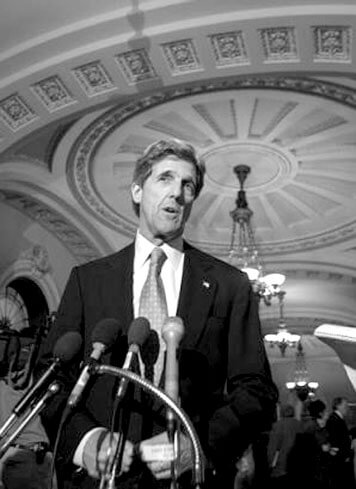“There is a religious war going on in our country for the soul of America. It is a cultural war, as critical to the kind of nation we will one day be as was the Cold War itself,” Patrick Buchanan intoned in his infamous speech to the 1992 Republican National Convention in Houston.
Having unsuccessfully challenged the sitting Republican president, George H.W. Bush, in the primaries that spring, Buchanan, in the interest of furthering his cultural war, spoke out in support of his erstwhile opponent, to call his fellow rebels “home.” Recalling the success that troopers from the 18th Cavalry, armed with M-16 rifles, had in quelling the riots that ripped through Los Angeles earlier that year, Buchanan closed as follows: “As they took back the streets of L.A., block by block, so we must take back our cities, and take back our culture, and take back our country.”
The chilling effect Buchanan’s words had on the prime time national audience left a lingering whiff of intolerance on the incumbent president’s re-election drive for the campaign’s duration. Yet George H.W. Bush’s son is headed down the same path Buchanan charted a dozen years ago.
The current president might rather mask his intentions with his trademark gauzy folksiness than have a latter day Buchanan oversell the case with stridency, but even the milder rhetoric employed by George W. Bush leaves no doubt as to his intentions: “The union of a man and woman is the most enduring human institution, honoring–– honored and encouraged in all cultures and by every religious faith. Ages of experience have taught humanity that the commitment of a husband and wife to love and to serve one another promotes the welfare of children and the stability of society.”
Pundits for months have warned that taking on the U.S. Constitution posed political risks for the president, but apparently his tumbling poll numbers convinced him he had more to energize on the right than to lose from the center. Whatever the accuracy of his calculations, Bush has now irrevocably re-ignited the ugly culture war of a decade and more ago, moving its command and control back into the White House from its recent outposts in the Congressional offices of Rep. Tom DeLay and Sen. Rick Santorum.
With much already on our plate––risks, hurdles, challenges, and opportunities–-the lesbian, gay, bisexual, and transgender community must recognize the war that has been engaged this week. No battle that we must fight or that we hope to fight has any hope of being made easier unless we first accomplish the most pressing need we face––the defeat this November of George W. Bush.
The Democratic candidates hoping to oppose Bush in November have been running for well over a year, though voters first had a say on January 19. Yet, in the five and a half weeks since Iowa held its caucuses, there have been 21 contests, and John Kerry, the Massachusetts senator, has won 19 of them, showing impressive geographic reach, from Virginia to Wisconsin, and from New Hampshire to Hawaii.
At a time of profound uneasiness about the state of the world, Kerry’s record as a war hero and his immersion in foreign policy matters in the Senate give him a strong perch from which to critique a president whose foreign policy has gone tragically awry. We will outline below where we expect a good deal more from Kerry on LGBT issues, and our concern about the senator’s comments in the past 24 hours to the Boston Globe about the anti-marriage amendment in Massachuetts is chief among them, but at two critical moments––when he voted against the Defense of Marriage Act in 1996 and when he opposed Pres. Bill Clinton’s “Don’t Ask, Don’t Tell” military compromise in 1993––he demonstrated impressive leadership on our issues.
The time has come for the LGBT community and Democrats generally to rally around the candidate best able to take the fight to Bush in November. That candidate is John Kerry, and we urge a vote for him in the New York primary on March 2.
The Democratic field this year was an unusually strong one, and several of the candidates distinguished themselves with the quality of the ideas they brought to the campaign. Howard Dean, the former Vermont governor, was well ahead of the curve in critiquing Bush’s folly in Iraq and in aggressively challenging the president in general. He also never shrunk from talking about the role he played in signing his state’s pioneering civil union law.
Dennis Kucinich, the U.S. representative from Ohio, though never a serious contender, pointed the direction in which the Democratic Party will eventually have to move, not only in his support for same-sex marriage rights, but also for the attention he placed on the need for universal health care.
North Carolina Sen. John Edwards has proven himself an enormously attractive candidate, and has used the spotlight he garnered to drive home a message about two Americas and the economic inequality that divides them. In the hands of less skilled messengers, this type of economic populism is often dismissed, unfairly, as class warfare.
Edwards’ partisans argue that it is not yet time to shut down the primary process, that Democrats want to see further duels between their man and Kerry. But it is hard to see where that will land Edwards. Based on the results of the first 21 contests, Edwards would have to win nearly 63 percent of the remaining delegates at stake in order to win the nomination. Since he clearly is not positioned to win that percentage in next week’s Super Tuesday contests, the hurdle rate will only grow higher for the subsequent contests.
Edwards clearly has a future on the national scene, but he will have to make his own decisions about how long to keep his quest alive this year. For the rest of us, the issue of paramount concern is how successfully Kerry positions himself for the race this fall.
Kerry is clearly a progressive, but one that like so many Democratic leaders has allowed himself to be guided by an overabundance of caution. Willing to stand up to the first Pres. Bush who Kerry was concerned was rushing to war in Kuwait, he failed to show the same resolve in holding George W. Bush accountable for winning international cooperation in handling Saddam Hussein the second go around.
Like most Democrats on Capitol Hill, Kerry was reluctant to challenge the commander-in-chief at a time when the nation was united in its shock over the events of 9-11. But Bush has lost much of his political cover since the fall of 2002 when Congress gave him war-making approval. Kerry need not worry now that he risks being out of step with mainstream opinion––the critique of Bush’s foreign policy that he and the other Democrats finally came around to has deep resonance among the American public.
Instead, Kerry’s job in the next eight months will be to prove he is a man of resolve and integrity.
On LGBT issues, he has proven he can be that man. In 1996, Kerry was one of only 14 senators––and the only one up for re-election––to vote against DOMA. In 1993, when Pres. Bill Clinton abandoned his effort to end discrimination against openly gay and lesbian members of the Armed Services, accepting the “compromise” thrust on him by the hawkish Democratic Senate Armed Service Committee Chair Sam Nunn, Kerry didn’t play along. He spoke out against the new policy, saying it was no better than the old one, and continued to press Clinton throughout his presidency to root out harassment in the military ranks.
But, Kerry has also shown caution recently, where decisiveness might better have served us and his cause. He has consistently stood against a federal constitutional amendment on marriage, but for several weeks was unwilling to speak out against the recent effort, adjourned but not beat back, to amend the Massachusetts constitution. As late as February 24, Stephanie Cutter, a top spokesperson for the campaign said she could not address hypothetical questions about Kerry’s reaction to amendment language that might emerge in the legislature, saying only, “Make no mistake about it, Sen. Kerry will support nothing that rolls back the rights and benefits provided by civil unions.”
But, in the February 26 edition of the Boston Globe, Kerry did spell out his views and they were not good news. He indicated he would support a state amendment overturning the same-sex marriage court ruling there if civil unions were enacted as part of the process. That is a a compromise that activists in Massachusetts are unwilling to co-sign, and it is puzzling why Kerry would take this stance on the eve of major primaries March 2 in ten states, including California, New York, and Massachuetts, all with large LGBT communities.
At a time when Bush has earned our enmity with his effort to re-make the federal Constitution, Kerry has unnecessarily muddied the waters. He would have done better to state simply that he opposes any constitutional amendment, state or federal, that sets policy and singles out a specific class of people for disparate treatment.
We plan to continue raising this issue and others as the Massachusetts constitutional drama plays out and Kerry advances to the fall election.
We sign on to Kerry’s candidacy mindful that he is not perfect and now disappointed with his latest statement on marraige, but also knowing that our community can have dialogue with him and must be at the table in order to press for the progress we will expect from the next Democratic president.


































